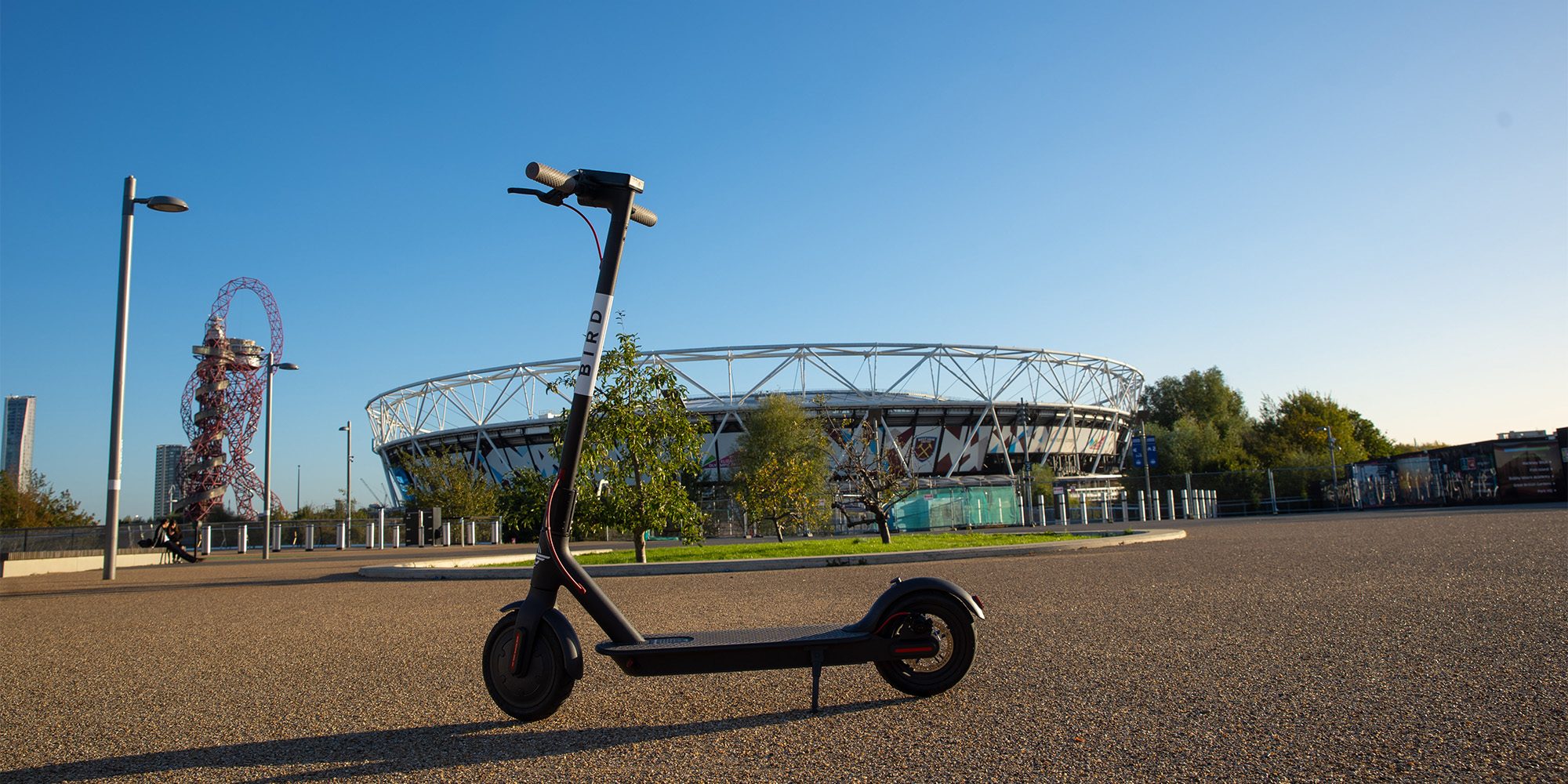Cleaner than cars, less sweat-inducing than cycling and faster than walking, electric scooters promise to shake up the way we get around cities. In fact, the Boston Consulting Group estimates that the global e-scooter market will be worth up to $50bn by 2025. But they’re still officially illegal in the UK and some city officials have bristled at their arrival, to put it mildly. Even so, can the likes of Bird overcome the legislative and infrastructure barriers to end the car’s supremacy – and in what ways could micromobility as a category redefine city life for the better? We sat down with Bird’s UK head Richard Corbett to find out…
For the last nine months, Bird’s electric scooters have been zipping around London’s Queen Elizabeth Olympic Park. But there’s a catch: the service is geofenced, which means your scooter stops working if you try to take it outside a pre-determined area. That’s because e-scooters are technically illegal in the UK – something Bird is trying to change through a pilot in the park.
There are two main laws in its way. The Road Traffic Act classes e-scooters as motor vehicles, but since they don’t comply with “normal vehicle construction rules” they’re not allowed on roads. The trouble is, they’re not welcome on footpaths either because the Highway Act of 1835 forbids any “horse, ass, sheep, mule, swine, or cattle or carriage of any description”.
Richard Corbett, the company’s UK head, is on a mission to find a place for Bird in the law. Based at Plexal, and with support from Here East CEO Gavin Poole and Plexal’s innovation team, he’s trying to convince the capital to change the rules. He wants to see e-scooters allowed on cycle lanes or roads with speed limits no higher than 30 miles per hour (Corbett is clear that he doesn’t think Bird belongs on pavements). The government’s response has been “maybe, but let’s see how it works in a small part of London first”.
Explaining the choice of Queen Elizabeth Olympic Park for the trial, Corbett says: “We didn’t want to do it in a place where we would just allow people to go around in circles for fun. What attracted us to this area was that there was a real mobility challenge: students and professionals needed to get from the main bus, train and underground stations at Stratford to the Here East campus. Bird provides a faster option than walking and an environmentally cleaner option than the shuttle bus.”

“What attracted us to this area was that there was a real mobility challenge”
Solving the last-mile challenge
Corbett’s describing the classic last-mile problem – that awkward stretch you have to travel that isn’t served by public transport, which makes driving or booking an Uber so tempting (around 40% of car trips in London are less than two miles). Explaining why Bird’s got the answer, Corbett says: “Even in a connected city like London you still get public transport black spots. If you have to walk 20 minutes to the tube, then face another walk on the other side, you’re going to be very tempted to just jump in your car instead. And not everyone wants – or is able – to cycle or walk. This has always made the car a difficult option to beat. Micromobility solutions like Bird can bridge that gap and make public transport more appealing.”
And with cities everywhere facing the twin challenges of congestion and dangerous air pollution, Bird could be arriving just in time. “We’re now in emergency territory when it comes to climate change,” says Corbett. “Our roads are getting clogged up with non-electric cars – most of which contain just one person – and we’re running out of space. But the good news is that both people and governments are waking up to the problem of climate change and are recognising that moving away from cars is part of the answer.”
Redesigning cities for micromobility
Corbett is also an optimist about the cultural and infrastructure changes needed to get over our car addiction. “If you look at the turn of the century, most people got around by horse and cart. Just a few decades later the car was commonplace. I think that as long as the government puts the right policies in place, we’re about to see a huge shift towards micromobility in a much shorter time, which will take place in tandem with a broader move from diesel and petrol towards electric.
In his vision of near-future transport utopia, he sees “an environment where public transport is electric, taking people between transport hubs, and where commuters have their pick of mobility options”. “We’ve gone really far down the road when it comes to designing cities for cars first, but we’re not past the point of no return. We can pull back and adapt cities to allow for more people-centric options, and it can be done relatively quickly and painlessly by utilising existing cycle lanes or turning car parking spaces into docking stations.”
Corbett also believes that a micromobilty-friendly future will bring more intangible benefits beyond cleaner air and less congestion – even changing the relationships we have with our cities. “When I ride a scooter it makes me feel more connected to my environment, and I’ve recently found myself stopping along the way more,” he says. “When you’re in a metal shell on wheels you miss all those bits in between A and B: the interesting one-man-band shops or local theatres, the unexpected things you discover on a street level without inhibition.”
This could bring life back to streets that are often bypassed. “When you’re just a five-minute Bird ride away from a tube rather than a 25-minute walk, location doesn’t matter as much: sub-prime areas will become prime areas and begin to mellow. We won’t have small, distinct pockets where all the retail or business activity takes place: there will be more harmonisation, and this will affect the way cities are planned. It’s going to be really exciting.”
Working with cities and making the case
But although Corbett’s itching to see Bird scooters added to London’s transport mix, the company has been sure not to annoy the city it’s hoping to win over. Learning lessons from its own experiences abroad, the company is tailoring its approach to avoid a knee-jerk reaction from government that would close the door to further exploration. “The UK government has a more cautious approach to legislative change and makes its decisions based on data, so the trial in Queen Elizabeth Olympic Park has been instrumental in allowing us to show how e-scooters could work in real life and demonstrate that we’re making safety a priority,” he says. It’s proved popular so far: over 50% of local residents have used a Bird scooter, and the company powers thousands of rides each month.

“the trial in Queen Elizabeth Olympic Park has been instrumental in allowing us to show how e-scooters could work in real life”
And if it’s data policymakers want, Bird is happy to dish it up. Its GovTech platform allows cities to see anonymised ride data (which could help them detect public transport black spots), designate no-ride zones or set speed limits for scooters in a particular location. According to Corbett, dockless bike schemes of old couldn’t offer anything quite like it. “Cities have had their hands burned by operators who weren’t transparent, so we’re coming from a position of collaboration and partnership. And data is a huge part of that. The days when startups could be insular and protective of the data they hold are over,” he says.
Corbett hopes this approach will pave the way for a new, less combative way for cities to work with startups: “Mobility players have a responsibility to be open with their data, and in return I’d like to see cities come to us with their challenges – it’s a two-way street.”
Quickening the pace of change in London
So far, Bird’s approach appears to be moving the needle in the right direction, but it’s clear Corbett wouldn’t mind stepping things up a gear. “The government announced a big review of UK legislation surrounding micromobility solutions but as of yet, we’ve not seen a start date. We’re also noticing that Brexit is delaying some decisions, and of course we don’t know what the attitude of the next set of decision makers will be when there’s a change – we may have to restart the conversations we’ve been having.”
But Corbett remains determined to keep things on track. “Although the UK is the last major economy in western Europe to legalise e-scooters, I have complete faith that we can catch up,” he says. “Why shouldn’t British people enjoy cleaner air like the rest of Europe, and all the other benefits of electric micromobility?
This isn’t just the story of one company fighting for the right to be on London’s streets. It’s a question of what we want city life to be like, how we can upgrade our infrastructure for new transport modes and how government can balance legislative prudence with an appetite for innovation. Corbett says he’s going to keep the conversation going – we’ll certainly be listening in.



